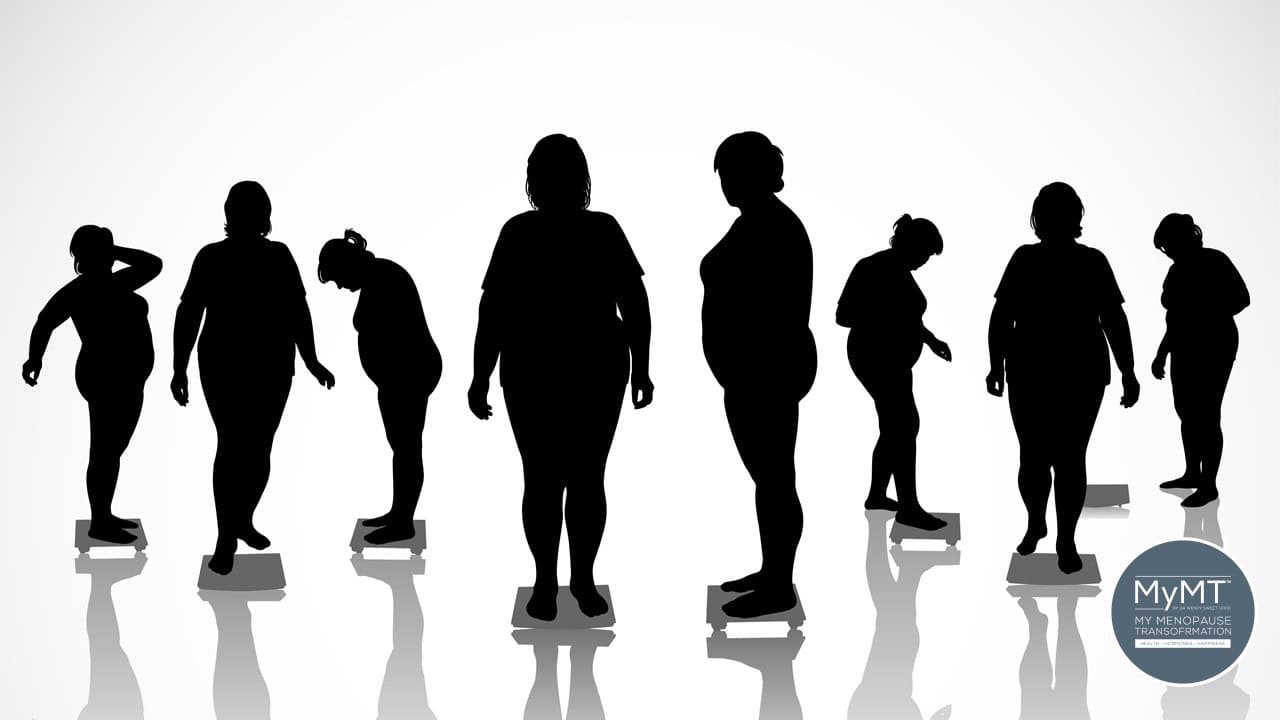For over 7 years now, I’ve been observing a quiet phenomenon with women on my lifestyle programmes. It happened to me as well and I wonder if it’s happened to you too?
The realization that weight gain, high blood pressure, changing cholesterol and higher-than-normal blood sugar was linked to my hot flush and night sweat severity, exhaustion, poor sleep and bladder problems, was a gradual one.
But as my belly and breasts increased in size despite daily exercise and dieting and blood work showed high triglycerides (fats in the blood) and high cholesterol, it finally dawned on me. I had developed a condition called metabolic syndrome.

Many of you may have heard of this condition. Metabolic Syndrome is diagnosed when women have at least three out of five conditions –
- a high waist circumference (84cms+ or 35 inches) – commonly known as ‘central obesity’
- high triglycerides
- high blood pressure
- high LDL cholesterol and low HDL cholesterol
- high fasting blood sugar
I guess you can work out that having metabolic syndrome isn’t a good thing – it contributes to worsening heart health and risk of Type 2 diabetes as we age. But now, with new research available, there’s something else to consider. Those women with Metabolic Syndrome also experience worse menopause symptoms compared to women without Metabolic Syndrome (normal body weight and no presence of underlying metabolic changes as diagnosed in Metabolic Syndrome).
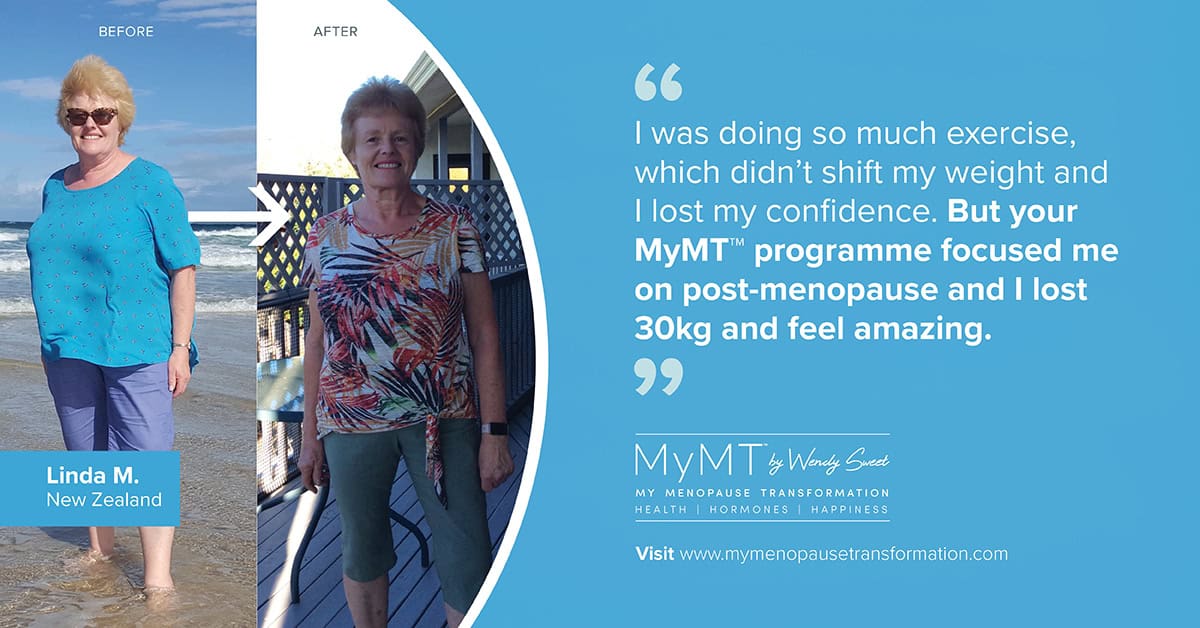
Attempting to differentiate symptoms from academic studies of women with metabolic syndrome versus women without metabolic syndrome was a huge task for the researchers.
Starting with over 3000 research papers, the researchers ended up with only 48 that they could realistically extrapolate relevant information from and whilst they noted a few challenges and limitations, this was the first study to open the door and seek some insight into what I’ve been learning from women on my programmes – that is, that there are different levels of severity of symptoms as well as types of symptoms for women depending on whether they are overweight with underlying metabolic changes or not.
The author’s conclusion? The symptom profile of women with metabolic syndrome was different when compared to the symptom profile of midlife climacteric women without metabolic syndrome.
‘’When the two conditions of metabolic syndrome and menopause co-occur, midlife women with metabolic syndrome are placed at a higher risk for significant symptom burden.” (Hee Min, Yang et al, 2022, p. 2)
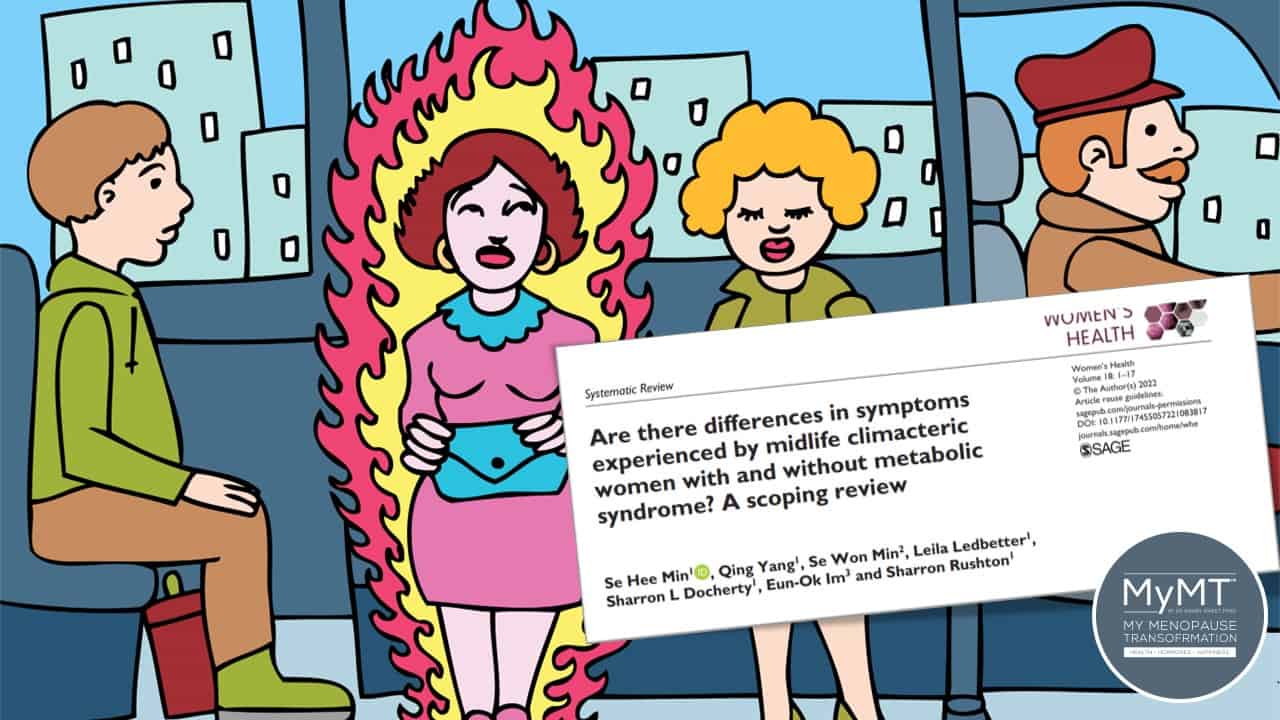
The symptoms that were more prevalent and frequent in women with metabolic syndrome included,
- mental exhaustion
- urogenital symptoms (including waking up in the night to pee)
- increased prevalence of vasomotor symptoms (this refers to hot flushes, night sweats and daytime sweating)
- poor sleep and difficulty staying asleep.
- muscle, joint and heart discomfort.
Interestingly, the authors found that the women who weren’t diagnosed with Metabolic Syndrome and weren’t overweight, had a higher prevalence of psychological disturbances.
These included mood changes and irritability with both groups experiencing anxiety. I see this anecdotally with thinner women who join me on my programmes – some of them respond well to HRT and anti-depressants too, but this is something they discuss with their Doctor obviously as my focus is on the evidenced lifestyle solutions.
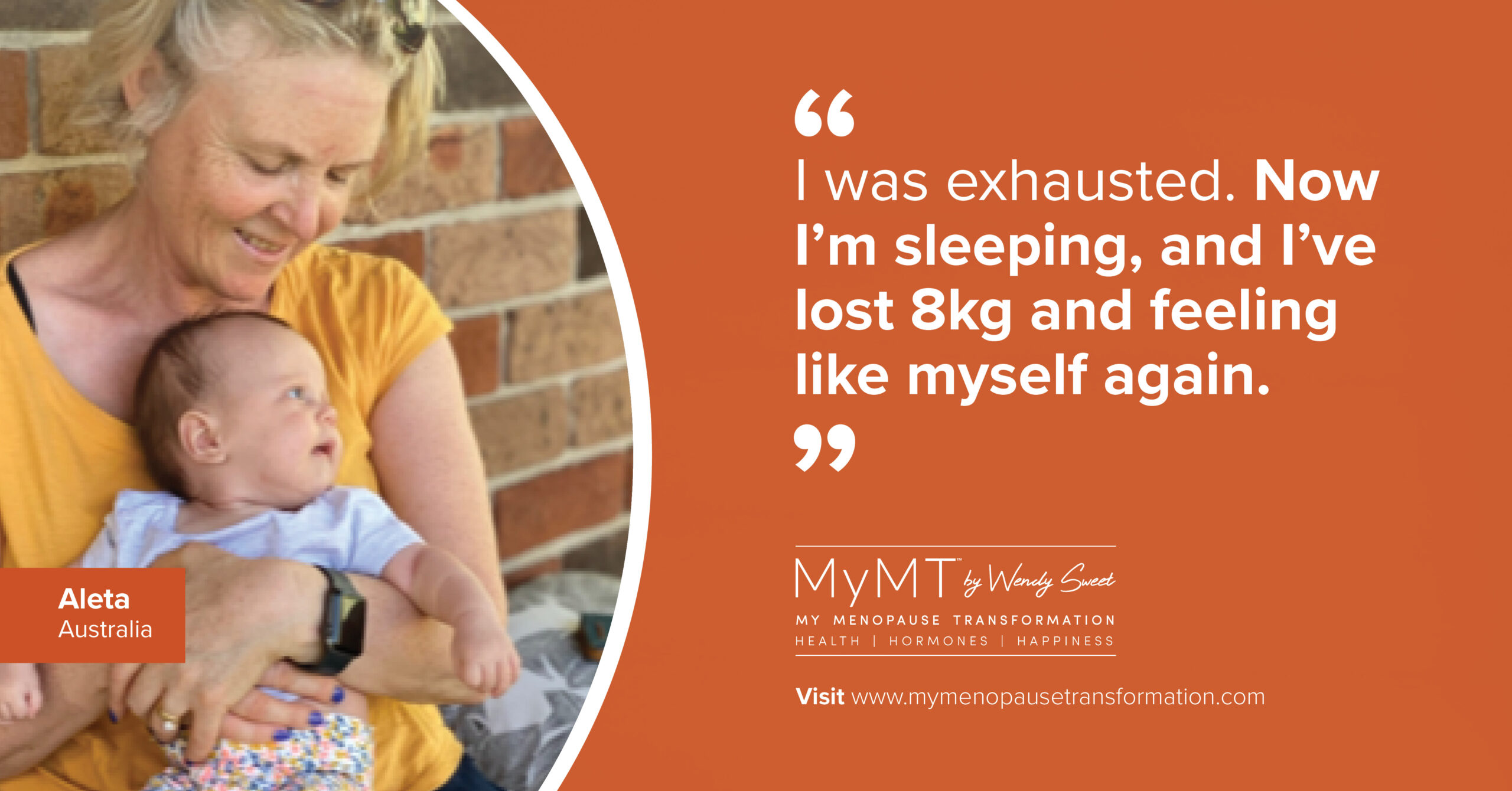
The ageing of the global population calls for a better understanding of the age-related metabolic consequences and age-specific metabolic changes differ significantly by gender mentions the authors of an extensive study exploring metabolic changes in menopause. (Auro, Joensuu et al, 2013).
As such, ‘Menopause is usually a cause of many concerns’, mentions the 2017 report on obesity in menopause (Kozakowski et al, 2017), ‘and one of the most important, is the fear of weight gain’.
Overweight and obesity, according to the definition of the World Health Organization (WHO) are considered as an abnormal or excessive fat accumulation that may impair health (WHO, 2016). For those of us who have ‘been there’ with our increased fat distribution during our menopause transition, some of these health issues include:
- higher blood pressure
- changing cholesterol levels
- erratic blood sugar levels which can lead to Insulin Resistance and Type 2 Diabetes
- aching ankles and muscles
- fluid retention
- and the issue that got me the most, an inability to tolerate exercise.
Like many women reaching their 40s and early 50s, my own weight gain arrived almost out of the blue. I was still exercising, eating healthily, but still I felt bloated and ‘heavy’, especially in my breasts. In comparison to hot flushes and insomnia, this was one of the most difficult changes in my body to comprehend. I had developed metabolic syndrome, which at the time, I wasn’t focusing on turning around. I was looking for ‘solutions’ in medications and supplements instead.
Metabolic syndrome is a cocktail of health issues (high blood pressure, high cholesterol, high blood sugar and high triglycerides and for many of you, fatty liver) that arises from being overweight or obese in menopause. If this is you, then focus on turning this around if you can, or join me on my Transform Me weight loss programme if you want to know exactly what to do in a systematic way.
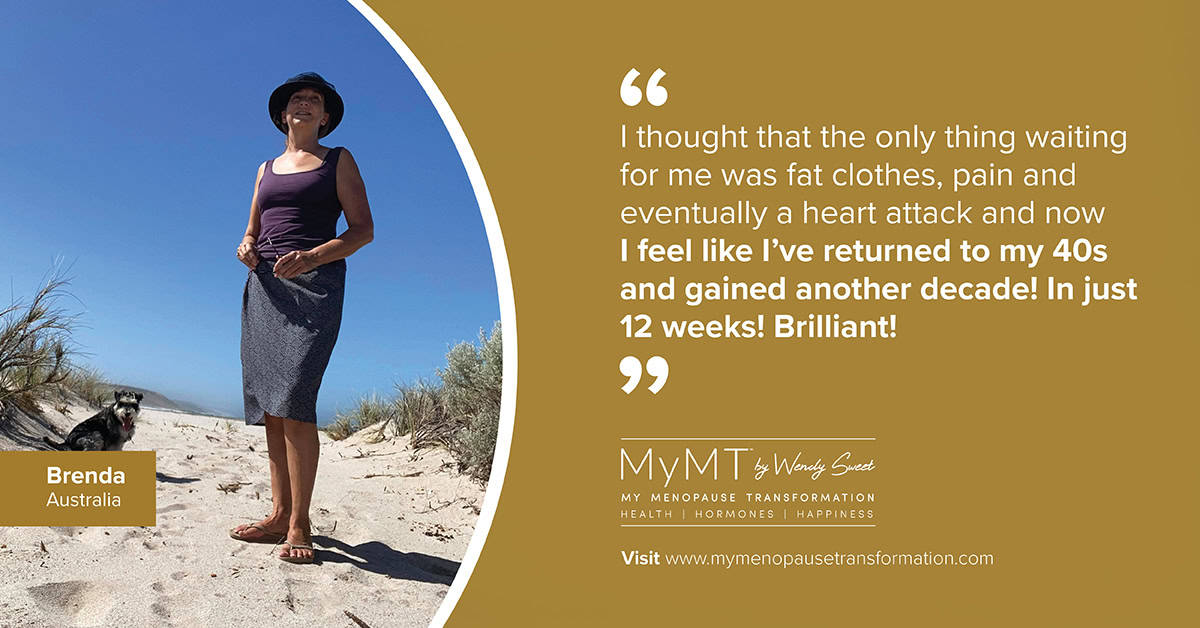
As I slowly pieced together the menopause-misery jigsaw, I pulled together cardio-vascular research, diabetes and heart-health research as well as physical activity and longevity studies and of course nutrition research, specifically targeted towards mid-life women’s health and weight management.
When we aren’t sleeping, when our joints feel sore and we are losing precious muscle and becoming oestrogen dominant, then our metabolism changes too. It’s why I loved this insight from research out of the Australian National University, recently published in the American Journal of Obstetrics and Gynecology.
If I had this research a few years ago, it would have saved a lot of lonely research of my own. In a review of studies that included more than 1 million pre- and post-menopausal women, the researchers learnt what I and many other women, have discovered in real life – that our waist circumference increases during and after menopause and as such, there is a shift in our metabolism, which can send us into worsening health with age.
“It’s important to understand how women’s bodies change as they age because women have higher rates of some diseases than men”, said Ananthan Ambikairajah, a PhD candidate at the Australian National University, who led the study. “The implications are important, because central fat has been linked with dementia risk, and central fat is linked with cardiovascular disease risk. As such, more attention needs to be paid to central fat accumulation, because that’s the bad stuff,” mentioned Ambikairajah.
Most of us know that every extra kilo of weight is an added burden on your joints, heart, liver, cholesterol, muscle function and insulin levels as you age. That’s what concerns numerous women on my 12 week Transform Me programme as well.
However, when you understand what to change and why, then not only do your symptoms begin to resolve, but you begin to understand the powerful connection that menopause has with the way we are ageing.
For women in New Zealand and Australia, this powerful online learning programme is on my 12 week VISIBLE RESULTS SPRING SALE for you at NZ$224/ AUS$207 (savings of NZ$75), only to the end of September, when you apply the promo code SPRING23 – I hope you can join me.
Dr Wendy Sweet (PhD)/ Member: Australasian Society of Lifestyle Medicine/ MyMT Founder
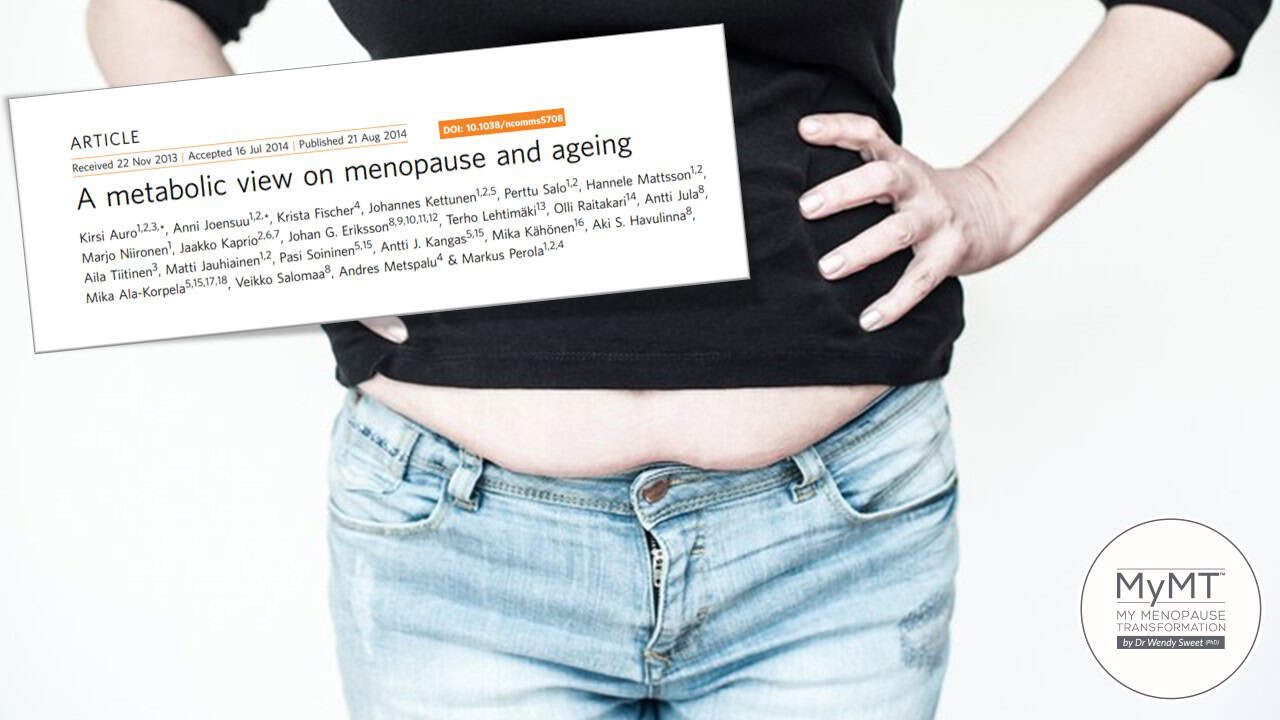
References:
Auro K, Joensuu A, Fischer K, Kettunen J, Salo P, Mattsson H, Niironen M, Kaprio J, Eriksson JG, Lehtimäki T, Raitakari O, Jula A, Tiitinen A, Jauhiainen M, Soininen P, Kangas AJ, Kähönen M, Havulinna AS, Ala-Korpela M, Salomaa V, Metspalu A, Perola M. (2014). A metabolic view on menopause and ageing. Nat Commun. Aug 21;5:4708. doi: 10.1038/ncomms5708.
Egger, G. & Dixon, J. (2009). Inflammatory effects of nutritional stimuli: Further support for the need for a big picture approach to tackling obesity and chronic disease. Obesity reviews : an official journal of the International Association for the Study of Obesity. 11, 137-49.
Kozakowski, J., Gietka-Czernel, M., Leszczyńska, D., & Majos, A. (2017). Obesity in menopause – our negligence or an unfortunate inevitability?. Przeglad menopauzalny = Menopause review, 16(2), 61–65.
Manco, M. ,Nolfe, G. , Calvani, M., Natali, A., Nolan, J., Ferrannini, E., Mingrone, G. (2006). Menopause, insulin resistance and risk factors for cardiovascular disease. Menopause, 13 (5), 809-817
Min, S. H., Yang, Q., Min, S. W., Ledbetter, L., Docherty, S. L., Im, E. O., & Rushton, S. (2022). Are there differences in symptoms experienced by midlife climacteric women with and without metabolic syndrome? A scoping review. Women’s health (London, England), 18, 17455057221083817.
Patni, R., & Mahajan, A. (2018). The metabolic syndrome and menopause. Journal of Mid-life Health, 9(3), 111–112.
Weickert M. O. (2012). Nutritional modulation of insulin resistance. Scientifica, 2012, 424780.
World Health Organisation (WHO). Obesity and Overweight Fact Sheets (2020). https://www.who.int/news-room/fact-sheets/detail/obesity-and-overweight
